బాజిగర్ - తెలుగు బ్లాగు. నా బ్లాగ్ ని విజిట్ చేసే వారందరికీ నా అభివందనములు. ఈ బ్లాగులో నాకు తెలిసిన అనేక మంచి విషయాలు మీతో పంచుకునేందుకు ఎంతో ఆసక్తి ని కలిగి ఉన్నాను. ఆదరిస్తారని ఆశిస్తూ... మీ బాజిగర్.
Wednesday, 28 August 2019
Godavari river at Mancherial Telangana మంచిర్యాల వద్ద నిండుకుండలా గోదావరి నది
Godavari river full of water at mancherial, Telangana.
Tuesday, 27 August 2019
Basic Accounting Terms
Basic Accounting Terms:
1. Account :
A formal record of a particular type of transaction expressed in money or other units of measurement and kept in a ledger. In other words, Account is a summary of relevant business transactions at one place relating to a person, asset, expense revenue named in the heading. An account is a brief history of financial transactions of a particular person or item. It is a "T" shaped proforma, which has two sides called the debit side (Left side) and credit side (Right side).
2.ACCOUNTING ENTRY:
A record of financial transaction in the books of accounts, eg. Journal, Cashbook Etc.
3. TRANSACTIONS :
Transactions are those activities of a business, which involve the transfer of money or goods or services between two persons or two accounts. For example, purchase of goods, sale of goods, borrowing from the bank, lending of money, salaries paid, rent paid, the commission received and dividend received. Transactions are of two types, namely, cash and credit transactions. Every transaction brings about change in the financial position of Business.
4. Accounting Period:
The period of time, for which an operating statement is prepared.
5. PROPRIETOR:
A person who owns a business is called as a proprietor. He contributes initial money to commerce business called capital with an intention of earning the profit.
6. CAPITAL:
It is the amount invested in the business by the proprietor. This amount is increased by the number of profits earned and the amount of additional capital introduced. It is decreased by the number of losses incurred and the amounts withdrawn by the proprietor for personal use.
7. ASSETS:
Assets are the proprietors or resources owned by the business. Cash in hand, plant, and machinery, furniture and fittings, bank balance, debtors, bills receivable, stock of goods, investments, goodwill are some examples of assets.
Assets can be classified into Tangible and Intangible.
a) TANGIBLE ASSETS:
These are the assets having a physical existence, which can be seen and touched, eg. Plant, Machinery, Cash, etc.
b) INTANGIBLE ASSETS:
These are the assets having no physical existence, but their possession gives to rise to some rights and benefits to the owner. It cannot be seen and touched. Goodwill, Patents, Trademarks are some of the examples.
8.LIABILITIES:
Liabilities refer to the financial obligations of a business. These denote the amounts which a business owes to others, eg. Loans from banks or other persons, creditors for goods supplied, bills payable, outstanding expenses, bank overdraft, etc.
9.DRAWINGS:
It is the amount of cash or value of goods withdrawn from the business by the proprietor for his personal use. It is deducted from the capital.
10. DEBTORS:
A person who receives a benefit without giving money or money's worth immediately, but liable to pay in the future or in due course of time is a debtor. Debtors may be traded debtor or general debtor. Trade debtor is one to whom goods are sold on credit and general debitor is one from whom some amount is receivable eg. Rent receivable from Raman. Debtors are shown as an asset in the Balance sheet.
11.CREDITORS:
A person who gives a benefit without receiving money or money's worth immediately but claims in the future is a Creditor. Creditors may be trade creditors and general creditors. A trade creditor is one who supplied goods on credit to the business and a general creditor is one to whom the business owes. Ex. A loan was taken from the bank, Salaries payable to employees, etc. The creditors are shown as a liability in the Balance sheet.
12.PURCHASES:
Purchases refer to the number of goods bought by a business for resale or for use in the production. Goods purchased for cash are called Cash Purchases. If it is purchased on credit, it is called as Credit Purchases. Total purchases include both cash and credit purchases.
13.SALES:
Sales refer to the number of goods sold that are already bought or manufactured by the business. When goods are sold for cash, they are called Cash Sales, If goods are sold and payment is not received at the time of sale, it is called Credit Sales. Total sales include both cash and credit sales.
14. STOCK;
Stock includes goods unsold on a particular date. Stock may be opening and closing stock. The term Opening stock means goods unsold at the beginning of the accounting period. Whereas, the term closing stock includes goods unsold at the end of the accounting period.
15. REVENUE:
Revenue means the amount receivable or realized from the sale of goods and earnings from interest, dividend, commission, etc.
16.EXPENSE:
It is the amount spent in order to produce and sell goods and services. Ex. Purchase of raw materials, payment of salaries, wages, etc.
17.INCOME:
Income is the difference between revenue and expense.
18. VOUCHER:
It is a written document in support of a transaction. It is proof that a particular transaction has taken place for the value stated in the voucher. It may be in the form of cash receipt, invoice, cash memo, bank pay-in-slip, etc.
19. RECEIPT:
A receipt is an acknowledgement for cash received. it is issued to the party paying cash. Receipts form the basis for entries in the cash book.
20. GOODS:
Merchandise purchased in order to sell. it is a commodity which a trader buys and sells.
What is an Accounting? Objectives of Accounting?
WHAT IS ACCOUNTING?
Accounting is a science and is often called as the language of business, where, business is a continuous human economic activity aiming at making a profit by producing or buying and selling goods or providing services for a price.
Accounting is considered as a system which collects and processes the financial information of a business. This information is reported to the users to enable them to make appropriate decisions.
AMERICAN INSTITUTE OF CERTIFIED PUBLIC ACCOUNTS (AICPA) Has defined the accounting as "the art of recording, classifying and summarizing in a significant manner, in terms of money transactions and events which in part, at least of a financial character and interpreting the results thereof".
AMERICAN ACCOUNTING ASSOCIATION (AAA) defines accounting as "the process of identifying, measuring and communicating economic information to permit informed judgments and decisions by users of the information ".
Objectives of Accounting:
1. To maintain accounting records.
2. To find out the result of operations.
3. To ascertain the financial position.
4. To communicate the information to users.
BOOK KEEPING
BOOKKEEPING :
Book-keeping is the branch of knowledge that reveals how to keep a record of business transactions. It is often routine and clerical in nature. It is important to note that only those transactions related to business which can be expressed in terms of money are recorded. The basic objective of bookkeeping is to have a permanent record of all business transactions. In specific terms, Bookkeeping is defined as, "The science and art of correctly recording in the books of account, all those business transactions that result in the transfer of money or money's worth ".
According to Northcott, bookkeeping is an art of recording in the books of accounts the monetary aspects of commercial or financial transactions.
In general, bookkeeping covers the following activities:
# Identifying the transactions and events.
# Measuring the identified transactions and events in a common measuring monetary
unit.
# Recording the identified and measured transactions and events in proper books of accounts in chronological order.
What is Transaction ?
WHAT IS A TRANSACTION?
A Transaction may be described as an event that occurs relating to Business and it brings about change in the financial position of the business. These business transactions are to be identified, measured, classified, recorded, summarised, analyzed, interpreted and communicated to interested parties so as to serve a basis for decision making.
Monday, 26 August 2019
వాస్తు VASTU FOR DIFFERENT ROOMS
6. Vasthu Advice for Dining Room: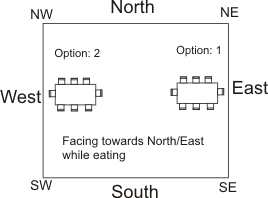

Vastu for Different Rooms:
- Basement
- Bathroom
- Bedroom
- Children room
- Couples Bedroom
- Dining room
- Drawing room
- Entrance Gate
- Exteriors
- Garden
- Grainary room
- Guest room
- Home Colours
- Home Temple
- Interiors
- Kitchen
- Locker room
- Medical room
- Open Patio/Verandah
- Plants
- Pooja room
- Septic Tank
- Servant Room
- Stairs
- Storeroom
- Study room
- Study Table
- Toilet
- Vastu Internal Arrangements
- Well and Tube Well
1. Vastu for Basement:
The basement is a need of every house today, but according to Vastu basement should be avoided in residence because low room/space or empty space under the house is not considered auspicious. However seeing the requirement of people, basement, if made in house, should not be used for living or sleeping purpose. This place compliments with basic rules of Vastu which must be followed in order to discard negativity that may arise due to the basement in a house.
Some rules for basement
Although any vacant space beneath the residence is prohibited in Vastu Shastra, yet if this place is constructed in a house it must correspond to Vastu principles. Here are some of the basic guidelines for the basement:
Some rules for basement
Although any vacant space beneath the residence is prohibited in Vastu Shastra, yet if this place is constructed in a house it must correspond to Vastu principles. Here are some of the basic guidelines for the basement:
- Primarily basement should be built in Northern or eastern direction of the house as according to Vastu principles there should be more space in east and north than south or west.
- The purpose of the basement should be either for storage or other things rather than living or any other recreational purpose.
- Place all the junk stuff including heavy equipment in the southern and western direction while making sure the shape of the basement is regular i.e. square or rectangle. An ill shape basement can cause inevitable losses and hinders the health of people.
- About 1/4 of the area of the basement should be above ground.
- Proper height of a basement should be at least 9 feet.
- Heavy stuff must not be kept in north or east of the basement.
- Paint your basement with light and subtle colors and avoid dark tints.
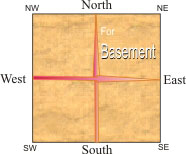
2. Vastu advises for Bathroom:
A Vastu complaint living place provides inmates a disease-free and barrier-free house followed by peace, harmony, and progress. Bathroom and toilet are basic sections of the house sometimes made anywhere which tends to give negative energy because both the places have a specific location according to Vastu principles. Bathrooms constructed in anywhere in the house leads to complications and severe problems related to health and finance.
Thus it becomes important to abide by Vastu principles when renovating or constructing a bathroom or toilet in the house so that the results won’t disturb inmates further. Vastu rules for bathroom are as follows:
Thus it becomes important to abide by Vastu principles when renovating or constructing a bathroom or toilet in the house so that the results won’t disturb inmates further. Vastu rules for bathroom are as follows:
- Ideally, a bathroom can be placed in the Eastern portion of the house.
- Fitting of pipes for drained water should be provided in North-east.
- The toilets should be constructed to the west of the building or the north-west side.
- Shower and taps in the bathroom can be attached on the Northern wall which is also suitable for the mirror.
- If there is an attached toilet in the bathroom itself then WC should be on the West or North-west side and few inches above the ground.
- Geyser should ideally be placed in the South-east corner.
- Bathtub must be located in West portion and provision for washbasin could be made in North-east.
- Overhead tank should be in South-west.
- There should be windows or ventilators in the east or the north.
- The bath should be taken on the west side.
- Choose bright and soothing colors for bathroom walls.
- The mirror should always be on the East wall.
- The dirty linens should be placed in the West Side of the bathroom as setting rays are very harmful to bacteria and kill them.
- If there is almirah, it should always be on the Southwest Side of the bathroom.
- The slope of the bathroom floor should be towards north and east so water drains to the northeast side of the bathroom.
- The suitable directions for keeping the washing machine are southeast and northwest.
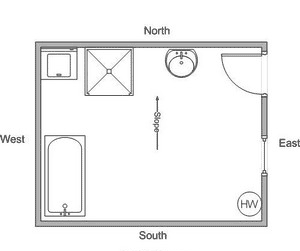
3. Vasthu Advice for BEDROOM:
The Vastu plays a major role in placement and designing of the master bedroom. The way you sleep with your head in a different direction and your placement of the bed is a major decision which must be taken properly with utmost care. Here are some basic points one must adhere to get peace and prosperity in your bedroom.
- The master bedroom should always be located in the Southwest part of the house as Southwest represents the element Earth which implies the heaviness, which makes it as the ideal place for the master of the house.
- This is not at all suitable for children room, guest room, servant room or any other room.
- A great deal of attention should be paid to bedrooms in a house. One should sleep with head towards South, East or West and never in the north.
- There should not be any beam crossing over the bed. If it exists, proper rectification should be done immediately otherwise the health will be affected.
- The bed placed should be on the South/West walls and if not there, it should be kept at least 4” away from the walls.
- The heavy almirah should be on the South/west wall.
- The construction material for the bed should be the wood and the wrought iron beds should be avoided.
- All the electronic gadgets should be placed at a distance from the bed as the Electromagnetic waves emitted by them interferes with the sleep.
- There should not be any mirror in front of the bed.
- The shape of the bed should be regular and any irregular shape should be avoided.
- The bed should never be placed in front of the bedroom door.
- The mattress used on the double bed should be a single one.
- The door of the bedroom should never produce the creaking noise.
- The color scheme for the bedroom in Southwest direction should be in any earthy tone like browns, shades of almond, all families of earthen color.
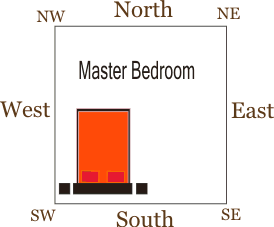
4. Vastu Advice for Children Rooms:
Children room is a hub of recreation, fun, and frolic; however, some basic things should be taken care of to make your child an all-rounder. Vastu complaint room suggests placing everything at its proper location according to the corresponding direction such as study table, bed, bathroom, and clock, and window, door and so on. Proper placement of things instills positive thinking in children’s mind to work harder and making then cheerful.
Every parent is keen to see their child’s progress in every sphere of life while there are some negative things that every house has due to Vastu defects which affect children behavior and mind. Improper placement of things transforms children into a brat, stubborn and low in concentration pushing their parents to get on nerves. Converting your child’s room with Vastu set of rules can perhaps give you positive results making your child obedient and progressive.
Some basic tips of Vastu for children’s room are as follows:
Every parent is keen to see their child’s progress in every sphere of life while there are some negative things that every house has due to Vastu defects which affect children behavior and mind. Improper placement of things transforms children into a brat, stubborn and low in concentration pushing their parents to get on nerves. Converting your child’s room with Vastu set of rules can perhaps give you positive results making your child obedient and progressive.
Some basic tips of Vastu for children’s room are as follows:
- West direction is ideal for children room and must be placed there.
- Keep the bed in South-west portion of room and let your child sleep with head towards South or East direction for peace of mind.
- The door of children room should not directly face the bed.
- South-west direction is best for placing furniture while avoiding any kind of furnishing in middle or center of the room which creates obstruction.
- Keep all the furnishing 3” away from the wall.
- Cabinets and closets should be placed in South or West direction.
- Avoid recruiting TV, computer/laptop in the children room as they affect child concentration. But seeing today’s scenario and compulsion computers should be located in North and Television in South-east.
- Avoid any exposed mirror in the children room and do not place any kind of mirror in front for bed.
- Study table should face East, North or North-east.
- Study area should be clutter free in order to boosts concentration and clutter-free ambience is good for generating new ideas.
- Good lights should be placed in South-east direction while avoid sharp lamps on study table which begets strain.
- To add freshness in your child’s mood brush up his room with Green or Blue hue.
- Doors in the children room are best at East or North.
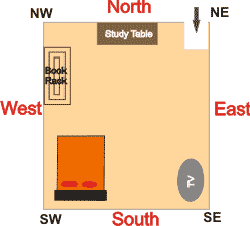
5.Vastu Tips for Couple's Bedroom:
Couple’s bedroom should be such that the ambiance effects in strengthening the relationship created out of nuptial bonds. Newly or years of the married couple doesn’t matter, but what matter is their eternal ties and to maintain good relationship Vastu says to construct bedroom with proper consideration. The bedroom is a hub to unwind stress and carry out different activities of life, and for a couple choosing bedroom inappropriate direction is important for many reasons such as to prevent the untimely death of a spouse, bad health, miscarriage in women, better and early conception, etc.- Couples bedroom should ideally be located in North-west* conditions apply or Southwest portion of the house.
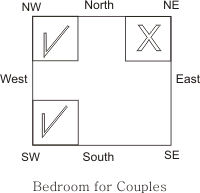 North-west is ideal if a couple is not elder in the family while South-west is most ideal if the couple is elder. * conditions apply
North-west is ideal if a couple is not elder in the family while South-west is most ideal if the couple is elder. * conditions apply- Avoid South-east corner for couple’s bedroom as it can lead to frequent clashes and quarrels.
- Couples must sleep with their head towards South and feet in the North.
- Do not keep the exposed mirror in the couple’s bedroom.
- A television screen, computer screen, and other exposed mirrors should be veiled when not in use.
- If possible, avoid TV and computer in the couple’s bedroom because the electromagnetic rays and vibrations from electronic objects create stress and tension.
- Any kind or size of the mirror should be shunned in the couple’s bedroom especially in the front of the bed and even at the side of the bed.
- Fresh flowers should be kept in the couple’s bedroom which symbolizes blooming of love and fragrance of flowers help to keep the relation afresh like always.
- Do no install scary or nude pictures and images in the couple’s bedroom.
- Avoid North-east for couple’s bedroom because this place is called as Eshaan corner ideal for worship room and constructing bedroom can have undesirable effects on couple’s married life such as untimely death of a spouse, health diseases and miscarriage or problem in conceiving.
- Couples bedroom can have light and bright colors on the wall which help to create a better understanding among partners.
Managing interiors with the Vaastu is a bit creative job but if everything is planned carefully, one can open the doors of prosperity for themselves. Now we will discuss dining room in detail.
- The dining hall should be placed in the West corner, as the setting rays will kill all the harmful bacteria present in the stored food.
- The dining can also be made in the East direction of the house, as the morning sun rays are very good for the health.
- The dining table should be a perfect square/rectangle.
- Dining table should not be sticking to the wall.
- If you want to place a fridge in the dining room, it should be in the southeast direction.
- While eating the members should face the east, north.
- The washbasin should be on the Northeast side of the room.
- The main door of the house and of the Dining Room should not face each other.
- The dining should not be adjacent to the toilet.
- The door of the Pooja room/ toilet should not open in front of the dining area.
- If the console has to be placed near dining for storage of crockery and utensils, it should be on the South/West wall of that area.
7. Vastu Advice For Drawing Room:
The aim of Vaastu is to make us live in harmony with nature taking advantage of the magnetic fields, gravitational effects, etc. of the earth, the rainfall, the galaxy and the whole of nature and the universe and duly invoking the blessing of the Gods of the directions. Every room has eight directions again, so one must be aware of the facts about how to design the rooms.
- Drawing Room should be in the east or north so one can get the morning sunlight and positive vibrations.
- The door of the drawing-room should be in the East or West.
- The sitting arrangement of the head of the family should be facing the east or in the north direction.
- The heavy articles of furniture or decoration should be in the west or the south direction because weight is the element of Southwest corner.
- The heavy chandelier should not be at the center of the room to make the Bhrmasthaan light.
- As far as possible TV should be in the southeast portion of the drawing-room as all electrical gadgets should be in SE quadrant, the fire zone.
- The portraits of God or waterfalls are hung in the northeast corner.
- Stuffed animals should be in the northwest corner.
- Furniture of this room should not be circular, triangular, egg-shaped hexagonal or odd shapes. It should be square or rectangular.
- Portraits of birds, animals, women, weeping children, scenes from the wars, etc. should not be displayed in the room as they give the gloomy feelings and thus the negative vibes.
- The color of the walls and the tiles used in this room should be white, yellow, blue or green. As far as possible it should not be red or black.
- No photograph of God should be hanged above the entrance door, from outside.
- The fireplace, if designed, should be done in the Southeast part of the living room.
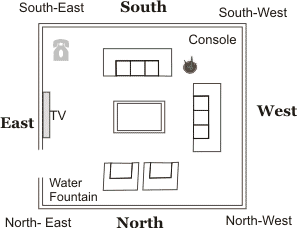
Vastu for Water Resources.
Vastu for Water Resource
Water tanks are important in every house and most houses install tanks random in direction wherever it is suitable. However, water tanks have their own place and direction where installation of water resource is considered ideal. Vastu tells some ideal directions to place water resource for better health, wealth and prosperity in the house. Water is an important element in Vastu and if its placement is not accordingly then it creates problems for occupants.
According to Vastu North-east is the place for water resource but there are some conditions in which water has to be placed such as over-head tank and under-water tank. Both the tanks can be located here in the North direction but under some conditions of working which are:
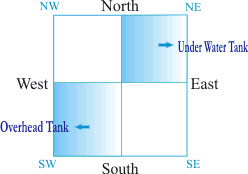
According to Vastu North-east is the place for water resource but there are some conditions in which water has to be placed such as over-head tank and under-water tank. Both the tanks can be located here in the North direction but under some conditions of working which are:

- The underwater tank should be dug in North-east direction while before digging a sump draw an axis marking from North-east to South-west while both the sides right or left are apt for the underwater tank. North-east is an important place in the home which is held scared due to which it should be left vacant as much as possible and that is why the underwater tank is recommended here. Avoid any water source/tank towards North-west or South-east.
- Over-head tank should be installed in South-west direction only because South is an inauspicious corner of the house where heavy things can be placed to equate the energies. Over-head tank in this direction balance energies to bring health, prosperity and all-round peace. Avoid over-head tank in North-east as it leads to unnecessary expenses and losses.
Effects of Directional Slopes in Vastu.
Effects of Directional Slopes
Slopes are significant & integral part of a plot and need proper consideration during the selection of Vastu plot. Vastu recommends building right slopes in the correct direction for the benefit and justice in terms of riches, happiness and good health. Some slopes built-in wrong direction where there should be equal level can be harmful to occupants and need to be corrected immediately after the determination. Home directional slopes affect health, success and achievements of occupants which is why it becomes all the more important to construct slopes with Vastu principles.
- The downward slope in the North-east direction of East is considered auspicious and must be considered.
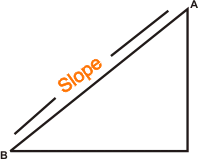 Favourable directions such as East, North-east and North must have slopes outside the plot as per Vastu while just to the opposite unfavourable directions slope are suggested inside the plot.
Favourable directions such as East, North-east and North must have slopes outside the plot as per Vastu while just to the opposite unfavourable directions slope are suggested inside the plot.- Plots having downward slopes in East, North and North-east are considered auspicious and beneficial for people but downward slopes in South, South-east, and North-west are average for people while if the entire downward slope is towards North-east then occupants much benefit from it.
- The downward slope in Eastward gives wealth, prosperity, name and success to the inmates while if the opposite then people have to bear problems like dishonour, failure in different spheres of life etc.
- A downward slope in North-east is very auspicious and people may acquire unflinching success, wealth and peace of mind. An upward slope in this direction brings loss of wealth, poor health and failures in business.
- If the plot is subjected to downward slope in West, occupants have to suffer from persistent illness, a mental problem like depression and loss of wealth etc.
- The upward slope in West yields positive results such as success, good wealth & health and spiritual progress.
- The downward slope in North-west surely acquires enmity, accidents, theft and bad health. The upward slope in this direction is beneficial and people acquire success, wealth, move abroad and even venture into politics.
- The downward slope in the North gives good results to the people of the house such as prosperity, wealth, and success. The upward slope here in the North leads to bankruptcy, depression and unrest etc.
- The upward slope in the South is considered good and beneficial in acquiring good health, peace of mind, wealth and riches.
- The downward slope in South leads to loss of wealth, poor health, mental imbalance and poor health of women etc.
- The upward slope in South-east is beneficial in many ways but less than South-west and downward slope in South-east is bad which brings health issues and financial problems at home.
- An upward slope in South-west is considered best and results in wealth, prosperity, promotion, obedient children etc. However contrary to this downward slope leads to chronic disease, untimely death and involvement in escapades.
Grading of Vastu Plots
Grading of Vastu plots.
Vastu segment plots into different types of grades to represent Excellent, Good, Average and Bad plot. There are four grades in a Vastu plot according to which every site is addressed:
Grade A plot: Excellent‘A’ grade plot is also called excellent plot which conforms entirely with Vastu norms while minor Vastu defect or dosh is negligible. The excellent plot is said to have everything in its place and in the right direction.
Grade B plot: Good‘B’ grade plot is said to be constructed with some flaws but more with Vastu norms and some defects can be ignored while others can be rectified.
Grade C plot: Average‘C’ grade plot is also named as Average because in this type of plot there are some Vastu defects in terms of location and placement of different section of the house in the wrong direction.
Grade D plot: BadD grade plot is considered as worst plot according to Vastu and must be given Vastu treatment by rectifying the defects as soon as they are determined.
Vastu tips for House Construction.
Vastu tips for House Construction
Vastu provides basic tips for the house construction that can be followed at the time of construction even they are also applied during the headhunting of the plot. These enormously useful tips of Vastu if followed religiously can yield best results immediately in terms of good health, wealth, prosperity and contentment. Here are some important and authentic Vastu tips for the house construction:
- Before starting the construction some things have to be considered such as the shape of the plot which is the most important to determine. Irregular shape plot can have bad impact on occupants, so choose regular plots such as a square or rectangle.
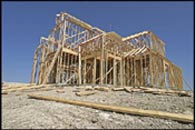 Vastu suggests digging a well in North-east and after that to start the construction.
Vastu suggests digging a well in North-east and after that to start the construction.- Open space should be given more towards the North and the East and less towards the Southand the West.
- Open space at South-east and North-west should be equal.
- Avoid planting trees in the North-east corner while all other directions are suitable. Heavy trees must be grown towards South, West and South-west side.
- More windows must be given towards East and North while Southern and Western sides must be avoided for windows and doors.
- Avoid doors in a straight line.
- Front door must be larger than other doors especially the exit door.
- In the plots, Western side must be elevated than Eastern side and Southern must be elevated than North to determine the auspiciousness.
- As discussed North-east is the first to dig and Vastu recommends starting construction from here and then move forward to East, North and finally South & West.
- After the foundation is dug in North-east pillars must stand to start from South-west and later to go in South, West direction and finally in East and North.
Sunday, 25 August 2019
Vastu Directions-వాస్తు దిశలు.
- వాస్తు దిశలు - VASTU DIRECTIONS
The orientation of a building is important to save energy and to build a better house design, which would be comfortable for living simultaneously gives positive energy, good health, prosperity and wealth to the occupants. A living place and its direction have a correlation between the rotational scenarios of the planets with respect of north.
There are total eight directions North, South, East, and West are called cardinal directions and the point where any of the two directions meet is called intercardinal or ordinal point like NE, SE, SW, NW. These directions are given a lot of importance in Vastu Shastra as they combine the benefits of two directions in totality.
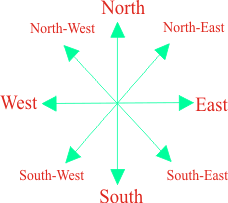 Our Shastra says if we worship, idolize and honor the Lords of these eight directions, people yield eternal blessings in the form of success, health, and prosperity. We will now examine their importance according to scriptures.
Our Shastra says if we worship, idolize and honor the Lords of these eight directions, people yield eternal blessings in the form of success, health, and prosperity. We will now examine their importance according to scriptures.
East: This direction is governed by lord Indra and he is known to be the king of Gods. He bestows wealth and pleasures of life.
South East: This direction is governed by the lord of fire- Agni. He gives us good personality and all the good things in life. Fire is a source of health as it is related to fire, cooking, and food.
South: This direction is of Yama, the god of death. He is a manifestation of dharma, and eradicates evil forces and bestows good things. It is a source of wealth, crops and pleasure.
South West: This direction is directed by Niruti, the god who protects us from evil foes. It is a source of character, demeanor, case of longevity and death.
West: This direction is directed by Lord Varun, the lord of rains. He bestows his blessings in the form of natural water-rain, brings prosperity and pleasures of life.
North West: This place is directed by lord Vayu and he brings on our good health, strength and long life. It is a source of change in the course of business, friendship, and enmity.
North: This direction is governed by Kuber, the god of wealth.
North East: This place is supervised by lord Eeshaan, and is a source of wealth, health and success. He brings us wisdom, knowledge and relieves us from all miseries and mishaps.
Vastu is a Science.
Vastu Is A Science
Vaastu considered the interplay of various forces of nature involving the five elements of earth, water, wind, fire and ether and strives to maintain equilibrium as these elements influence, guide and change the living styles of not only human beings but every living being on earth. Thus they influence our deeds, luck, behavior and other basics of life.
Vastu Shastra is the sublime elucidation of your surrounding and their influence on your life. Vastu literally means " house" or Dwelling Place and its principles establish to create a harmony between the fine elements viz. Earth, Sky, Fire, Water, and Air in the environment.
Vastu Shastra unifies the science, art, astronomy, and astrology, it can also be said as an ancient mystic science for designing and building. Vastu Shastra helps us to make our lives better and will secure from things going wrong.
Vastushastra is an ancient building science which covers the philosophy and theory of Architectural works to construct any building and as well as the living style of people. Vastushastra is based on various natural energies, which are available free cost in the atmosphere like:
Vastu Shastra is the sublime elucidation of your surrounding and their influence on your life. Vastu literally means " house" or Dwelling Place and its principles establish to create a harmony between the fine elements viz. Earth, Sky, Fire, Water, and Air in the environment.
Vastu Shastra unifies the science, art, astronomy, and astrology, it can also be said as an ancient mystic science for designing and building. Vastu Shastra helps us to make our lives better and will secure from things going wrong.
Vastushastra is an ancient building science which covers the philosophy and theory of Architectural works to construct any building and as well as the living style of people. Vastushastra is based on various natural energies, which are available free cost in the atmosphere like:
|
Utilization of such energies gives us pleasure peace, prosperity, and money, etc in our life
Vastu can be used for every room, every house, every temple, every shop industry, town planning, tour, cities and even for earth. Vastu can be used for micro as well as for macro level.
There are three forces in action to create harmony. Wind, water and fire or, Vaayu, Jal and Agni. If these forces are kept in their appropriate places, then there will be no disturbance. But if the water is put in place of fire and wind in place of water or in any other combination, the forces will start acting accordingly and create disharmony and unpeacefulness.
Vastu can be used for every room, every house, every temple, every shop industry, town planning, tour, cities and even for earth. Vastu can be used for micro as well as for macro level.
There are three forces in action to create harmony. Wind, water and fire or, Vaayu, Jal and Agni. If these forces are kept in their appropriate places, then there will be no disturbance. But if the water is put in place of fire and wind in place of water or in any other combination, the forces will start acting accordingly and create disharmony and unpeacefulness.
What is Vastu? || అసలు వాస్తు అంటే ఏమిటి?
Vastu (వాస్తు )
Vastu is the science of direction that combines all the five elements of nature and balance them with the man and the material. Vastu Shastra is creating congenial settings or a place to live or work, in the most scientific way taking advantages of the benefits bestowed by the five elements called "Paanchbhootas" of nature thereby paving the way for enhanced health, wealth, prosperity and happiness in an enlightened environment.
The world comprises of five basic elements, also known as the Paanchbhootas. They are Earth, Water, Air, Fire, and Space. Out of the nine planets, our planet has life because of the presence of these five elements.
The Directions
The importance of orientation of a building is not only for saving energy but also to have a better house design, which not only gives comfortable living but also gives good health, prosperity and wealth to the house owners/occupiers and these families. There lies a co-relation between the rotational scenario of 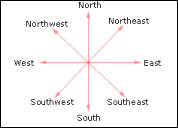 the planets and the house design and their different directions with respect of NORTH. The building of any type and its construction meets the purpose if proper orientation has been given using suitable local building material. It increases not only its life span but also improves the condition of occupants. There are instances where buildings are not planned according to required local orientation were lost or deteriorated much faster than the buildings having built with proper studies of orientation.
the planets and the house design and their different directions with respect of NORTH. The building of any type and its construction meets the purpose if proper orientation has been given using suitable local building material. It increases not only its life span but also improves the condition of occupants. There are instances where buildings are not planned according to required local orientation were lost or deteriorated much faster than the buildings having built with proper studies of orientation. The proper orientation means the proper knowledge of all the eight directions. It is a common knowledge that the direction from where the Sun arises is known as East and where it sets as West and when one faces the East direction, towards one's left is North and towards one's right is South. The corner where two directions meet obviously is more significant since it combines the forces emanating from both the directions. SO in all, there are eight directions, North, Northeast, East, Eastsouth, South, Southwest, West, West north. Every direction has its own significance and has its own construction. The basic rules of Vastu Shastra are based on these eight directions.
Vastu is essential
Vastu forms the basics of each construction; one must follow Vastu from the initial level i.e. from choosing a plot to shift in the house. Everything should be done according to Vastu principle since Vastu is not merely a word but it is a SCIENCE and a bridge between man and nature. Vastu is followed while choosing a plot, how to choose a plot: the shape, the nature of the soil. When and how to construct a house, how to do the interiors, how to choose the color and when to shift. Vastu is such a deep science that it is a pool of information and one can have any doubts cleared with proper reasoning.
Vastu is unique
Vastu is a science that has originated from India. Feng shui is an art of harnessing energies. Though both have the same objective, the benefit of humanity but the principles are very different. I am a strict follower of Vastu as it is originated from India and it's based on our culture, traditions, geographical conditions, climatical conditions and everything for India. And Feng Shui is originated in China and based on their culture and traditions.
Vastu Vidya
Vastu is not a religion but is a vidya, a science. It has been developed thousands of years ago, in the middle time we have become so modern that we forgot our Vedic culture. Now that we are facing all kind of problems, we are coming back to Vedas.
Our ancestors had given us "Yog" but we did not take it seriously, it went abroad, renamed as "Yoga", now we are running after it and foreign countries are making a profit out of it. WHY?? Why we cannot respect our own culture. We are following their culture and they are following ours.
Vastu only teaches us to follow the rules of nature and to balance the five elements from which we all, this universe is made up of.
The system of Vastu is an admixture of science, the astronomy of astrology; it is covered with the influence of the sun, moonlight and heat, the earth's atmosphere, wind direction, magnetic field and gravitation force on human beings. It gives practical guidelines on site selection, its contouring level, the orientation of the building in relation to climatology and micro weather, arrangements of areas/rooms in relation to the different activities of the proposed building. Their proportions as well as rituals for successive stages of house building.
Vastu science is founded upon the laws of nature. The equilibrium we observe in nature is easily perceivable by us in all moving bodies, but unfortunately, we are unable to note this equilibrium in static bodies. The basic source of energy of the whole world is stored at the North and South Pole. It flows uninterruptedly from the North Pole to the South Pole in the form of magnetic waves. Therefore Southward portion of every building should be higher than the northward portion so that there may not be any hindrance to the flow of magnetic waves.
Our ancestors had given us "Yog" but we did not take it seriously, it went abroad, renamed as "Yoga", now we are running after it and foreign countries are making a profit out of it. WHY?? Why we cannot respect our own culture. We are following their culture and they are following ours.
Vastu only teaches us to follow the rules of nature and to balance the five elements from which we all, this universe is made up of.
The system of Vastu is an admixture of science, the astronomy of astrology; it is covered with the influence of the sun, moonlight and heat, the earth's atmosphere, wind direction, magnetic field and gravitation force on human beings. It gives practical guidelines on site selection, its contouring level, the orientation of the building in relation to climatology and micro weather, arrangements of areas/rooms in relation to the different activities of the proposed building. Their proportions as well as rituals for successive stages of house building.
Vastu science is founded upon the laws of nature. The equilibrium we observe in nature is easily perceivable by us in all moving bodies, but unfortunately, we are unable to note this equilibrium in static bodies. The basic source of energy of the whole world is stored at the North and South Pole. It flows uninterruptedly from the North Pole to the South Pole in the form of magnetic waves. Therefore Southward portion of every building should be higher than the northward portion so that there may not be any hindrance to the flow of magnetic waves.
Subscribe to:
Comments (Atom)









